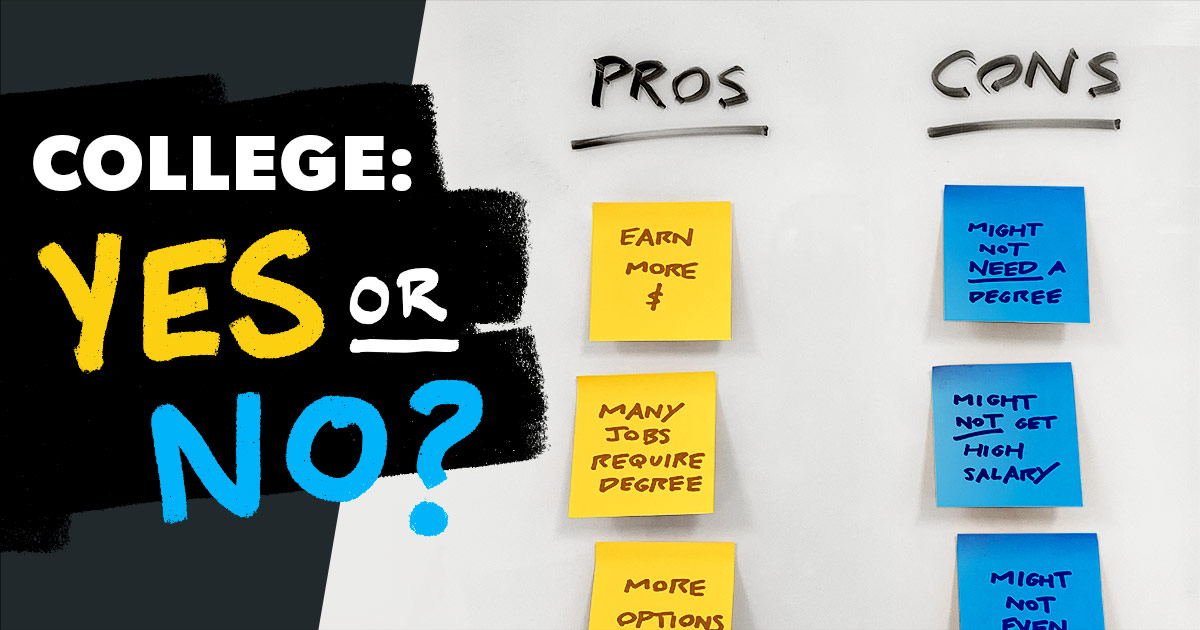For years, we’ve been told that going to college is part of the American Dream. That a degree is the golden ticket to a well-paying job and meaningful work. That it’s the only way for someone to avoid missing out on their full potential.
But folks, the narrative is changing—and it’s easy to see why.
For starters, college tuition and student loans have gotten completely out of hand, with the average student loan balance sitting at $38,290.1 Plus, attending college doesn’t give people a leg up in the professional world like it once did. It now takes graduates an average of 15 years to earn back the money they spent getting their bachelor’s degree.2 That’s insanity.
On top of all that, more and more industries are willing to hire people without a degree. By the end of last year, 34% of companies in the U.S. had dropped college education as a requirement for all their salaried positions, and 45% reported that they don’t pay employees more for a degree or certification.3
Get expert money advice to reach your money goals faster!
This all leads to an important question, one that I hear all the time from callers on The Ken Coleman Show: Is college worth it?
Is College Worth It for You?
My answer to that question is . . . it depends.
For some, going to college is absolutely the right choice—and I am not anti-college by any means. For many others, though, it’s just not worth the investment of time and money.
Luckily, there’s a simple way to figure out if college is worth it for you (or for your kids, if you’re reading this as a parent). You just need to ask two key questions.
1. Is college the only way to achieve my career goals?
Some career fields out there—like law, nursing, engineering, education and medicine—still require a degree. So if you’re planning to work in one of those areas, you’ll obviously need to go to college. If not, then college isn’t the only way to accomplish your career goals.
Remember: 34% of companies in America don’t require a degree for any of their salaried positions. Plus, another 41% say it depends on the job.4 Those numbers are growing every day.
You should never assume the industry you want to join requires a degree to get in the door. Instead, go online and do some research. Find job postings for entry-level roles at companies you’d like to work at one day. You may discover that “college degree” is nowhere to be found under the job requirements.
2. Is college the best way to achieve my career goals?
Just because college isn’t required for your field doesn’t automatically mean it’s a bad idea—it may still be the best option. To see if that’s true, sit down and weigh all the potential paths to get where you want to go professionally.
For example, you may be able to get qualified by:
- Completing an affordable training or certification program
- Beginning to work and gain experience right out of high school
- Taking on an apprenticeship
If you determine college is the best and most efficient option, it’s probably worth it. This might be true for careers like graphic design, journalism and marketing, where earning a degree can get you in the door faster or can give you a head start on learning key industry-specific knowledge.
But if an alternative to college makes more sense than spending four years in school, then go in that direction.
Let me add a caveat though: You should not pay for college with student loans. Not only will they take an average of $393 out of your monthly paycheck (that’s over $4,700 per year!), but it takes some people 30 years to pay them back.5,6 And you shouldn't have to go into debt to get a good job.
Moral of the story: If you go to college, pay for it with cash. Choose an affordable school, apply for scholarships, and get a part-time job (just watch out for those MLM recruiters). You can save even more by starting in community college and transferring those credits to a four-year school.
How to Choose a Career Path
You probably realized that before you can answer those two questions, you need to know what type of job you want. I understand that some people start by picking a school, and then they choose a major, but that’s all backward. They’re booking a reservation at a restaurant without looking at the menu first.
You can’t decide where you want to go without getting clear on what you want to do.
Now, answering a question as broad as “What should I do with my life?” can be overwhelming and way too complicated—but that’s not what I want you to do. There’s a much simpler way to point yourself in the right direction.
You just need to dig into these three questions:
- What am I good at? We all have talents—things we don’t have to try to be good at because we simply are good at them.
- What do I enjoy? I’m not talking about video games or pickleball here. Instead, consider the types of work you’re passionate about. What gets you fired up?
- How do I want to help people? You don’t have to cure cancer or land on Mars to make an impact. Everything from creating a marketing plan to fixing a broken refrigerator helps move the needle in our world.
Once you’ve answered those questions, start brainstorming potential career paths. What types of jobs would let you use your talents to do work you enjoy while helping people in a way that connects to your heart?
That, my friend, is your professional purpose.
The Pros and Cons of College
If you’re wondering why I’m so passionate about this topic, it’s because I see way too many people waste time and money on a degree they don’t need—and I feel bad for them. College comes with costs beyond the tuition, and the price outweighs the benefits for a lot of people.
The way I see it, there are two significant pros to attending college:
- Some jobs require a college degree. Like we talked about earlier, graduating college is still the only ticket for entry into some career paths.
- You’ll have access to resources and opportunities. Colleges offer resources like guidance counselors, career centers, job fairs, clubs and, of course, internships—one of the best ways to gain experience.
Then, we have the cons:
- You might not need a four-year degree to get the job you want. Here are a couple more stats for you to digest. The University of Washington reports that about 53% of college grads are unemployed or working a job that doesn’t need a degree.7 And as of 2023, the employment rate for 25- to 34-year-old high school grads who didn’t go to college is a solid 74%.8 Trust me, you can find a way to earn a solid income without a degree—whether you want to work in person or work from home.
- It can be expensive. The average cost of just one year of college can range anywhere from about $27,000 for a public, in-state university to a whopping $56,000 for a private university.9 Unless you’re entering a career field that pays an astronomical income, investing six figures for a degree often isn’t worth it.
- You might regret it. According to a Payscale survey, 66% of those who pursue education beyond high school regret their degree type, institution, major or student loans.10 That’s two-thirds! Plus, only about 62% of college students finish their degree within six years—a recipe for even more regret.11 And since many solid jobs (including some remote ones) only require a training or certification, which is way less expensive, it often doesn’t make sense to get a pricey degree.
I don’t share that list to scare you away from pursuing a degree. Again, I’m not anti-college. It’s the right choice for plenty of folks. I just want you to understand that you’ve got to take a hard look at your situation before investing four years and a whole lot of money.
The Bottom Line
At the end of the day, just make sure you’re being intentional when deciding whether college is worth it for you. You can’t fly by the seat of your pants with this stuff—because you’ll wind up making a mistake, and there’s too much money involved for that.
But if you carefully consider your options and make a well-informed choice, you’ll be in good shape and set yourself up to do work you love.




